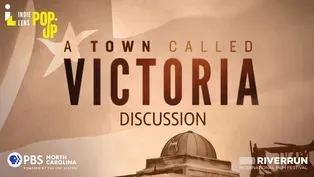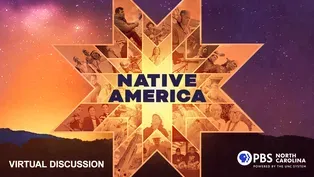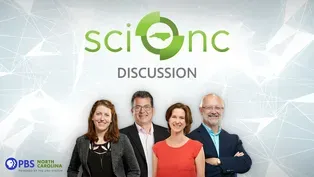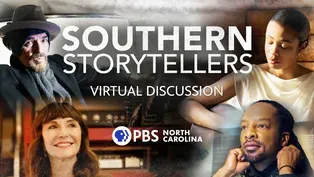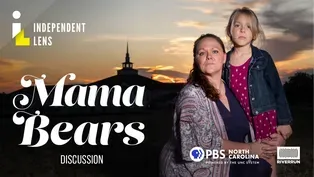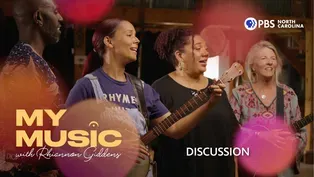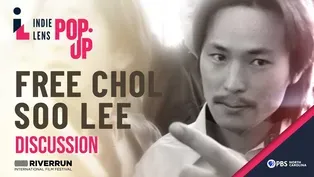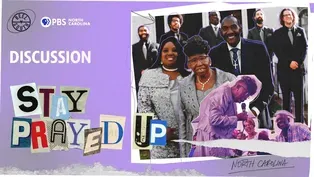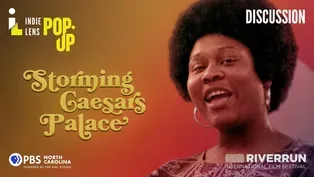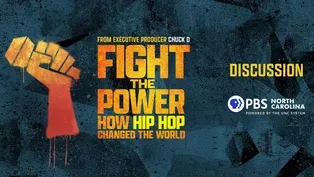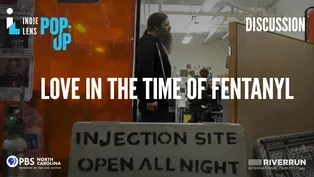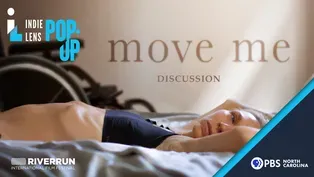PBS North Carolina Specials
Discussion | Independent Lens: Writing with Fire
3/1/2022 | 38m 8sVideo has Closed Captions
PBS NC hosts a discussion about India’s only all-female led news organization.
PBS NC’s Shannon Vickery leads a conversation with local Indian scholars, professors, journalists and non-profit leaders. They discuss the struggles, casteism and violence the all-female Dalit reporters of Khabar Lahariya face daily while trying to report on politics, racism and crime, and run an independent, digital news media network in Uttar Pradesh, India.
PBS North Carolina Specials
Discussion | Independent Lens: Writing with Fire
3/1/2022 | 38m 8sVideo has Closed Captions
PBS NC’s Shannon Vickery leads a conversation with local Indian scholars, professors, journalists and non-profit leaders. They discuss the struggles, casteism and violence the all-female Dalit reporters of Khabar Lahariya face daily while trying to report on politics, racism and crime, and run an independent, digital news media network in Uttar Pradesh, India.
How to Watch PBS North Carolina Specials
PBS North Carolina Specials is available to stream on pbs.org and the free PBS App, available on iPhone, Apple TV, Android TV, Android smartphones, Amazon Fire TV, Amazon Fire Tablet, Roku, Samsung Smart TV, and Vizio.
Providing Support for PBS.org
Learn Moreabout PBS online sponsorshipMore from This Collection
Discussion - A Town Called Victoria - Independent Lens
Video has Closed Captions
The filmmaker and former Victoria residents share their story. (46m 51s)
Discussion - Native America Season 2
Video has Closed Captions
Panelists discuss preserving the languages of Native American tribes. (39m 1s)
Video has Closed Captions
Sci NC executive producer and host, Frank Graff, chats about upcoming Season 6 of Sci NC. (26m 6s)
Discussion - Southern Storytellers
Video has Closed Captions
Author David Joy and others discuss storytelling and their new PBS series. (42m 13s)
Discussion - Mama Bears | Independent Lens
Video has Closed Captions
Producer and director Daresha Kyi discusses the film and LGBTQIA+ advocacy. (34m 41s)
Discussion - My Music with Rhiannon Giddens
Video has Closed Captions
Discussing the series with producers Will & Deni McIntyre and country artist Rissi Palmer. (39m 56s)
Discussion - Free Chol Soo Lee | Independent Lens
Video has Closed Captions
Local lawyers, professors and nonprofit leaders discuss wrongful convictions and reentry. (40m 44s)
Discussion - Stay Prayed Up, Reel South
Video has Closed Captions
The filmmakers discuss their journey with Mother Perry and The Branchettes. (45m 4s)
Discussion - Storming Caesars Palace | Independent Lens
Video has Closed Captions
Local professors and nonprofit leaders discuss welfare and the social safety net. (33m 2s)
Discussion - Fight the Power: How Hip Hop Changed the World
Video has Closed Captions
Local experts discuss the history of hip hop with PBS North Carolina. (59m 43s)
Discussion - Love in the Time of Fentanyl | Independent Lens
Video has Closed Captions
Local harm reductionists, therapists and others discuss the opioid crisis and more. (55m 44s)
Discussion | Independent Lens: Move Me
Video has Closed Captions
A dancer with blindness and disability advocates discuss adaptable arts programs. (38m 46s)
Providing Support for PBS.org
Learn Moreabout PBS online sponsorship- Hello, everyone and good evening.
Thank you for joining us.
I'm Shannon Vickory with PBS, North Carolina.
And tonight we have watched an Oscar nominated documentary "Writing With Fire."
The film was a powerful one and also difficult to watch at times.
In our conversation tonight, we wanna provide a safe space for an open and informative community driven conversation.
So please be respectful while entering your comments and questions for this evening's panelist in the chat feature to the right of your screen.
While now I am honored to welcome some very special guest to our conversation this evening.
A local scholar, a professor, a journalist, and a nonprofit leader.
So please allow me to introduce Pallavi Gupta, a doctoral candidate at UNC Chapel Hill in the department of geography.
Dr. Deb Aikat, an Associate Professor in UNC Husman, School of Journalism and Media.
Yashica Dutt, Journalist and Author of "Coming Out as Dalit" and Shruti Parikh, Head of Voter Engagement for North Carolina, Asian Americans together.
Thank you all for joining us.
Why as you just saw the film was filled with obstacles for the all female news team of Khabar Lahariya, which means waves of news.
The main obstacle the women faced was their place in the centuries old cast system.
So Yashica let's start with you because you have written about this film in an article for the Atlantic and you call the film a masterclass in journalism, and then you go on to write that the women featured in the film are, quote, "good journalists who through their relentless reporting are not only changing their own life, but also ushering a quiet revolution and the life of nearly every subject they come across," end quote.
Tell us more about the impact that you see these journalists having on the communities in which they serve.
- Absolutely.
First of all, I'm incredibly thankful and honored to be here.
And I am so grateful that PBS took the initiative to show the documentary, which I might add has still to be released back in India.
So the fact that the U.S. audience is able to get a perspective of the lives of these incredible journalists is for me a moment to be extremely proud of because I am also a Dalit woman and I was born and raised in a lower cast family.
And of course our circumstances, the circumstances of that I personally grew up with, are very different from the women and the journalists of Khabar Lahariya, who are arguably covering from rural Northern India and they're facing a completely different set of challenges.
Having said that I think it's important for us to understand that Dalit journalists in India and internationally, of course, simply don't exist.
In an article that was in Aljezeera somewhere around 2016, 2017, the journalist who was writing that who's also that it themselves was able to find only four to five Dalit journalists who were open and out with their identity.
So in a landscape, which is so controlled by upper cast folks, which is to say people were from dominant cast, they are the editors, they're the reporters, they're writing the headlines, they're giving the perspective of their stories.
So where do we find the Dalit perspective?
It was very difficult.
And I worked for seven years before I moved to New York for Columbia graduate degree.
I worked at for as a journalist while hiding my identity, which is a phenomena.
We, you know, identify now as passing something that we see within the black communities as well, where, you know, a lot of black folks will try and hide their identity in order to, you know, more so, much earlier, maybe in the 50s than now, but like, it's something that we see within Dalit in India also where we have to hide our casts.
So I had to hide my cast for nearly seven years, because I was extremely worried about the repercusions of revealing my lower cast status in the newsroom and how difficult it could be for my career, for the stories I get, the bylines I receive and the promotions which might be stopped.
So that was me working in an urban newsroom in new Delhi, which is the capital English speaking, English writing, you know, everything that we sort of understand is synonymous with modernity or something that might not be tied to cast origins.
But of course that wasn't the case.
Now, if you pull back the focus and understand how difficult it must be for these journalists to operate in rural areas, I spoke to the editor in chief of Khabar Lahariya, which is the organization that we see profile in "Writing With Fire."
And she told me that, you know, people just didn't expect women to be journalists in those areas.
There were upeer cast journalists, there were dominant cast journalists who were mostly men.
And if, as you see in the film, the kind of satellite into the scene of crime, and then they leave.
So they're not really from those communities.
Like we have Suneeta who is a child minor.
She grew up working those minds.
So she understands those issues.
And then later we see her cover it.
We see her report it.
And the reason I called this film, a masterclass in journalism is because of the practices and ethics of these journalists themselves.
If you look at, you know, the sourcing and I understand that we saw just an hour of the film, but I would encourage everybody to log into PBS on March 25th.
Please check the dates when it's being aired.
You'll see incredible reporting happening on scene, where you have examples of shoe, leather, journalism, where, you know, somebody's not able to find a source, one of the reporters and then she looks through, she takes a photo of the police records, which are not being given to her, but she's able to somehow do that.
And through those records, she finds the number of the victim, the father of the victim who has been raped, the rape survivor.
So, you know, there are these examples.
We see the journalists sitting crouched on the ground and speaking to people who have gone through enormous suffering, mainly because of their cast.
So they're speaking to them on their level.
The people understand that these are women who know them, who are from their communities, and there is this incredible amount of trust.
As a journalist, it's something that all of us can learn from, how to build that trust and that transparency in our reporting, yeah.
- Indeed.
It is just an incredible film all around.
Pallavi, I wanna talk a little bit about your research that you are doing, because you are currently researching about the Dalit women in India and the cast system.
So help continue to put the film into context with us.
At one point, one of the reporters talks about the fact that we have all of this technology today, people are, you know, are going into space and back, but yet at the same time, the cast dynamics continue.
Help put that into context for us.
- Yes.
So I think I'll just start with echoing what Yashica said, I'm really like honored to be part of this panel with Yashica, Dr. Deb and with the other panelists and thank you to PBS for this opportunity.
And thank you Shannon for the question.
And I think I wanna start at the outset by first mentioning that I am upper cast and a middle class and an international student who, and I'm studying cast in the intersection of cast with gender and labor in my research.
And even to be able to answer this question for me, I must acknowledge the expertise in lived experience of countless Dalit women, men, and communities in terms of who encounter violence of cast on an everyday basis.
So I think I just want to mark that is really important in terms of also where I'm speaking from and my own cast positionality, and in terms of what she says in the movie about that we've gone to the moon and, you know, cast system continues to exist.
So what is cast system or cast it is graded.
It is hierarchical.
It's an exclusionary system of organizing society.
And the way it is structured is that you have four learners.
So the social classes as per Hindu society.
So you have the Brahmins the priestly class, followed by you have the Kshatriyas, the warriors, then Vaishyas, who are the business of the merchant class, and then Shudras peasants and laborers and lates who were earlier called untouchable cast and who Dr. Amkha called oppressed cast.
They fall outside this 40 hierarchy.
And so what becomes relevant is also to note that there are these sub cast, which are again in this hierarchy and thus every sub cast, except those who are at the very top and the bottom have somebody above or below them.
So in terms of how system kind of, or what is cast system and how the uneven or the exclusionary nature of it, and that we see in the film as well at different points.
In terms of the second part of the question on the what you called the resilience of cast, and I'll base that in terms of, since it's really broad also to think about I'll try and answer the second part in terms of my own research.
So in my work, I look at the intersection of gender, cast and labor, and especially in the context of the Dalit women.
And I would argue that the class system has become an ally of capitalism and here and what I do in my work as well is that I allude to the work of scholars like Cedric Robinson, Laura Polito, who have talked about capitalism and how capitalism uses racial difference to abstract value.
And similarly, in the Indian context, how capitalism has leveraged cast difference to generate value.
And so for me, this is one reason why I feel that cast is stubbornly persistent in the Indian context.
Yeah.
- Thank you for that.
Dr. Aikat, you are a former journalist.
You are a faculty member.
You've been on the faculty at UNC Chapel Hill at the Husman School of Media and Journalism for more than 26 years now.
From your perspective, how remarkable is it that this group of Dalit women have first created the newspaper?
The newspaper has now grown into this news network and through their use of digital technology, they're reaching more and more people every day.
You know, one statistic more than half a million YouTube followers.
How significant is that?
And what does it say about the people who are not only reporting the news?
Theere's women are reporting the news, but also the people who are consuming it.
- So thank you so much for asking that question.
Like our co-panelists Shannon, we are honored to be on this.
I share the sentiments of Yashica, Pallavi and I look forward to what Shruti has to say, but I wanted to say that this whole episode and the whole thing that we are talking about relates to the empowerment of technology.
And so to, as you can well imagine that this is a story that resonates with everybody because Dalits are the marginalized groups and every society has a marginalized group.
Now much, as you all were talking about the cast system, I grew up in India, and I think my parents did a great job of insulating me from the cast system, because I did not realize what cast I was in until I went to a temple where we were worshiping and the priest asked what is Gotro, which means your religions to something.
So it was, and I think my parents did a great job, but I think the cast system has very bad effects, but there is a significant part of India that has gone away from it.
Me being one example of it, I do not relate to the cast system, but much as we talk about this, I relate to all of the things that Pallavi and Yashica has said, you know, believe it or not in the workplaces, in the Silicon valley and other modern places of the U.S., the cast system has made its ugly presence, but let's go back to your question.
Technology is empowering marginal growth.
And so these stories have been told in many ways, you know, when Gandhi started the freedom movement, he used the newspaper as a means of communication and he empowered the whole freedom movement.
And actually he coined a term which has become very controversial now.
There is this whole concept of untouchable, means there are people who you should not touch and he called them, Harijans, Hari means God.
Jan means the people of God, and that has attended more controversy because some people feel that that's a very insulting word to use.
So while all of this is going on, I think this whole story Khabar Lahariya, illustrates the power of technology to transform our society.
These women are empowered by a video or whatever technologies that have, and they have a voice.
Similar to what we are finding in the United States, where as you know, there were police killings or police shootings, but now because of a mobile video, you now have evidence.
So I think this is a great example and this story, and this whole film has resonated with people because it has lessons for all of us.
All our communities have marginalized groups and they can be empowered with technology.
Thank you.
- Shruti I wanna bring you into the conversation because as voting engagement director with the North Carolina, Asian Americans take together organization, you're working on strategies to get more Asian Americans to register to vote and to go out to vote.
So for you, how does the themes of tonight's film connect directly with the work that you were doing here in North Carolina?
- Absolutely, thank you.
And I will also echo my panel, the co-panelists, thanks and feeling of honor for being here today.
So thank you for including me.
So this year, I will have to say that I think that many of the themes in this movie can parlay into civic engagement.
You know, Dr. Aikat mentioned that through the power of technology, these women gained a voice and I would say that that voice helped them to drive change.
And I think that that's what we try to do in North Carolina, we try to ensure that our community has a voice so that collectively we can work together and drive change for our communities as well.
And we do that in many different ways.
We show up at where our communities meet.
So at local grocery stores, we have multilingual volunteers to help educate and inform our community members about issues and about voting and the consequence of voting and the importance of why we must vote.
And then it's also important to have a representation, right?
I mean, representation is so important, not just in our elected officials, but also in those people that speak to us.
And so at UNCAT, by going out, having people that are from within the community, talking to each other about these issues, we're able to show people that it's okay to talk about these things.
It's important and our voices need to be heard so.
- Yashica, let's talk a little bit about your book "Coming Out as Dalit".
What inspired you to write this book and how are you using this book to encourage dialogue and understanding?
- Yeah, thank you for that question.
I do want to say that it's not officially released in the United States and the rest of the world yet.
Though I'm hoping that changes very soon.
- We look forward to it very soon.
- Thank you.
Thank you so much.
I hope publishers out there are listening, but "Coming Out as Dalit" is my debut memoir part, not fiction part, and kind of an argument that cast is still and has always been a part of Indian societies.
You know, we are hearing here today about how cast has been erased.
I actually, and the whole book is an argument that works against that and just like racism, just because people are now seeing that they have black friends doesn't mean that racism doesn't exist.
Cast is a similar system.
It's a system of set of privileges that has continued over thousands of years.
So, and in Indian societies, we have this tendency to somehow erase its existence.
We as Dalits have been gas lit for decades, especially as far as I can remember, I've been told that cast doesn't exist anymore.
"Coming Out as Dalit" is an argument which is leased with facts, analysis and data to prove once and for all that cast is a part of our societies, whether you are able to see it or not, it does have impacts on our lives.
It's a part of societies back in India.
And as we see for on the Cisco case, the bups swaping out the temple case, and also the fact that California State Universities, and so many other universities in the U.S. are including cast discrimination as a factor in their policies shows us that cast discrimination is actively a part of U.S. societies as well.
So "Coming Out as Dalit" is my personal story.
It talks about how I had to pass as an upper cast person in order to hide my identity, how I overcame that.
It's a journey from shame to pride because I'm not just like, you know, going back to one of our co-panelists where she mentioned that cast is a graded system.
It's uneven, it's, you know, one is always above the other.
I am actually from one of the lowest of the low casts, which is the manual scavenging casts.
And not only does it come with being on the lowest on scale, it comes with a deep sense of shame.
It comes with a deep sense of unworthiness, being told that just because you are born in that cast, you don't deserve to feel as equal as anybody else.
So my book is a journey of overcoming that sense of shame and realizing that not just like Megan Markel famously said, "We have a voice."
We don't need to find it.
We have a voice, we just have to be empowered enough to use it.
I was able, I was empowered enough to use that voice through that book.
After I moved to the U.S., when for the first time I moved away from Indian socities and this relentless question about what my cast is, 'cause I had to hide it.
I had to lie when somebody would ask me what my cast was and they would ask me pretty much all the time, I lived in Delhi.
I moved in these so-called young hip, urban circles, and even there cast did not leave me.
So the fact that cast doesn't exist is kind of incorrect as proven my book and dangerous because cast is invisible.
I would urge our listeners to check out this incredible article that is published today in Wired Magazine, which talks about the story of this person who works at Facebook and what he to do to hide his cast and survive in Silicon Valley in the United States.
So the book is essentially telling us that cast has not gone anywhere and if you are telling us that it doesn't exist anymore, here's what you need to see.
Here's what you need to read.
- Pallavi, I wanna bring you into the conversation now, because one of the things Yashica has mentioned throughout the film, we're seeing how the cast system is supported by the institutions.
And at one point, Suneeta is talking about the role that the cast system plays in her decision related to marriage.
How do you explain, and from your research, how are you seeing the cast system today still being ingrained in an institution like marriage?
- Yeah.
Thank you for that question Shannon.
I was just thinking about the film as well, in terms of how Suneeta says it's freedom of choice when she talks about cast and marriage, sorry.
Even she talks about marriage in relation.
So I'm thinking like in terms of cast and the institution of marriage, I think so just to explain that that cast system encourages a particular form.
So it encourages endogamy and what is endogamy?
The practice of marrying members of the same cast.
So traditionally the way it's been is that marrying outside one's cast has been frowned upon.
But this is also changing in India.
So, but it also stands true in many areas and in many context, and there are many examples of this instance, like what Suneeta was also referring to, like for many young women.
And just to give an instance, if we were to think about, say in the North Indian states of India, say Haryana and Uttar Pradesh, which is shown in this firm.
So in these regions, there's also the presence of Kapanchiles, which if one were to translate would be cast councils like an approximate translation and these Kapanchile, they still discourage into cast marriage and do so often very violently.
So the way it plays out is that on the one hand you have Kapanchiles who are policing intercast marriages.
And then if you look further, so if we kind of, so as give an example of North Indian states, if we kind of look at the Southern states, we don't have to kind of go too far in that sense.
If we look at say the newspapers, and if you look at matrimonial pages in newspapers in India, and especially if we talk about in the Southern Indian context as well, we realize that cast is like alive in kicking because most of the matrimonial ads have a cast based preference for bride or bride groom.
So just in terms of how these norms continue to operate even today.
- Doctor Aikat, we've gotten a question from the audience and we've had a great engaged audience throughout the screening and the discussion this evening.
But what several people have asked this question and it's, do you think these journalists are safe?
Or should we be concerned about their safety because of their reporting?
And I know as I was watching the documentary, there were several when they were, you know, in the middle of reporting a story where I was on the edge of my seat, just to, you know, see what was gonna happen next.
So how would you answer that question Dr. Aikat?
Are these women safe now that this documentary is getting a wider release and more people are seeing their work.
- So like all of you, I would like to think that these women are safe and they would be protected and society will take care of them.
But the truth is somewhere else.
As you know, depending on how annoyed the police officer is, your safety is on a level and truth be told, these are problems that rural India faces.
These are problems we have in any community where, you know, you feel that you are at the mercy of the authorities.
So, but I would like to say that since these women have a voice and a significant voice at that, I don't think they have things to fear, but much as I say this, there is a lot of oppression and exploitation because of what they are doing.
Look at it this way, their stories, this is powerful storytelling at work, but their storytelling is at least affecting or harming somebody's reputation.
And those people will not be happy.
They would like these voices to be muffled.
And how do you muffle a voice?
We see it all over that people would either try to threaten them if threatening doesn't work, journalists have been killed.
And I'm not just talking about India.
And I think all over the world, including as you know, our nation, we have had situations where there are political parties and leaders who do not want these voices to be heard.
So I would say they are safe because of the visibility they have now, but that could be a short lived freedom that they have.
- Well, thank you for that context and that information.
Shruti how does all this play into the community engagement at work that you're doing and the efforts that you and your organization are doing to try to get more people involved in the community conversation, more involved in making decisions and getting out to vote and being a part of that larger conversation that we're having across the state, the nation and the world.
- Yeah and thank you for that question.
You know, I will say that, especially in the South Asian community and other Asian communities, what happens back home affects us here as well.
You know, during 2020, I had many conversations in which people were asking me, or, you know, talking to me about a political situation in India and saying that their vote depended on how that situation in India was gonna be resolved.
And we had to have many conversation about why people needed to focus on our politics here today.
It's a heavy conversation to have, but we do that, like I said, we do that through education, our community engagement efforts revolve around education, around identity work.
We actually have a very strong youth engagement program.
And one of our interns actually did a project on the Dalit problem here in the U.S.
It was fascinating.
I was raised here and not in India, so I haven't encountered the cast challenges myself, but to learn about it from a young student, living here was an amazing, yeah.
So I definitely think that getting education to our communities, helping them understand how easy it is to vote and how easy it is to advocate for our community is really the important thing.
Last year, we had a lobby day.
It was the first Asian American lobby day at the North Carolina general assembly.
And we had about a hundred people show up both in person and virtually, and everyone walked away with a better understanding of how laws were passed, how government works, and most importantly, how easy it is to be engaged.
- This has been an incredible discussion tonight.
And I have have one question that I would like for all of you to weigh in on as we start to wrap things up for the evening.
Where do you see these women, these powerful women, the voices that they have, where do you see them two years from now, five years from now as looking into the future?
Dr. Aikat, let's start with you.
- So that's a very good question.
And while you were asking that question, I was thinking there could be only two scenarios, one the bad, and the other the good, the bad could be that besides authorities and police officials, there could be upper cast men.
I mean, talking about cast system now, you know, there is a tension in society between the upper cast and the lower cast, and it often shapes up in very severe ways.
I would say the future holds good.
There would be other communities who would emulate these examples.
So you have a lot of rural communities benefiting from this.
And before you know it, there will be several philanthropic entities who would fund such effort because technology and training is very important before you try to do these.
So I see more of these things happening and maybe it would be global phenomena, if not, it already is like, as you and I know that there are several communities, even where we live, where the rural folks they have gotten together, they have their own community, newspaper community outlet.
And so I see this going positive.
- Yashica your perspective as you cast your eyes towards the future.
- Yeah, actually Shannon, great question because I have spoken to them, I know a little have a little bit of an insight into their real plans.
So I think one thing we should understand is they're not just a rural community based newspaper working somewhere in the back of the beyond.
These women have example to emulate.
And now what they're doing is they're acting as leaders.
They have a portion and I encourage everybody to go and check their website, it's khabarlahariya.com.
They have an English article where they're producing subscription based stories in English for the global leadership.
So that's something I encourage everybody to look into.
Outside of that, they have a module called jumble academy, which is where they train rural jornalists, more women who don't even have to be literate because a lot of them are either literate or semi literate, but they have the capacity and the power to tell stories.
So what they're planning to do is to empower and create rural journalists, not just somebody who can be looked at and pitied, but empower journalists, doing a good job of reporting for rural areas.
You know, we've been hearing in media how rural journalism is dying across the world.
This is the way to move forward in my opinion, as we move ahead, as we look ahead, rural journalism is the way to go and Khabar Lahariya and its journalists are that example.
- Pallavi, what are your thoughts as you look into the future?
- I kinda echo what Yashica said in terms of that I think it's absolutely remarkable how powerful these women are and acknowledging that every time watch the movie in terms of, even in the context of where they're located.
So more power to them to speak truth to power is one of my first things.
And second, I also see them growing professionally over the years, even more and more resources to them.
And I also see them as human rights defenders in terms of their vision, because they're not just reporting news, but they're also reporting very important news and they have a very clear stand and perspective in terms of their reportage.
So I think for me, that's really critical as well.
- And Shruti, as you look towards the future, can you give us an eye towards North Carolina and how you see all that we have learned tonight.
All we have seen with this film where you see it heading in the future and how it impacts us here across the state.
- Yeah absolutely.
I mean, I think that for me, the word that jumps out is representation, you know, to see these women, their voices empowered, their ability to tell their stories from a unique perspective.
I think that we can all be inspired by that.
And here in North Carolina, I think that we can use that inspiration to make sure that our voices are heard.
And as you know, we have a primary election coming up on May 17th, and it would be just incredible if the Asian community and if all marginalized communities could come out and make sure that their voices are heard.
- Well, it has been an honor to join all of you for this discussion.
And I know that I have been inspired by this film and inspired by all that we have discussed this evening.
So thank you so much to our wonderful panelists for joining us this evening and for sharing their expertise, experience and perspective with us.
Also a special thank you to our event partner, Riverrun International Film Festival.
And thank you for logging on and participating in the conversation.
Now, a reminder that you can watch or stream the feature length version of "Writing With Fire" on Monday, March 28th at 10:00 PM on PBS NC, or your local PBS station.
Also be on the lookout for an email next week with the link to this recorded discussion, information on how and where to watch and stream "Writing With Fire" and all independent links films and audio survey and helpful resources.
And a reminder that to ensure PBS North Carolina continues to bring you riveting documentaries, informative how-to programs, fun lifestyle shows, exciting initiatives, a 24-hour kids channel and free screening and discussion events just like this one.
I hope that you are inspired to make a tax deductible donation to PBS NC.
You can do that safely and securely at PBSNC.org.
If you are already a member, we appreciate you so much.
To all of you thank you and have a great evening.
